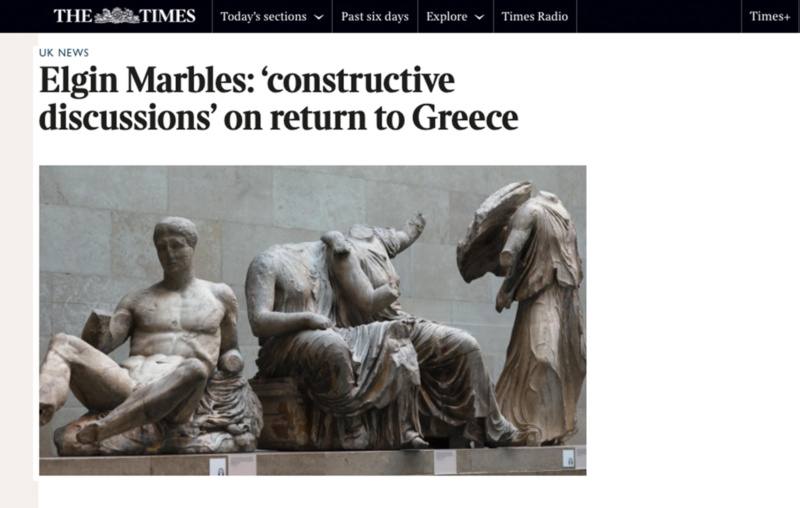The British Museum confirmed “constructive discussions” are taking place over the possible return of the Elgin Marbles to Greece after 200 years, as part of a cultural exchange.
George Osborne, the former chancellor who is now the museum’s chairman, is believed to have drawn up an agreement that would repatriate the 2,500-year-old cultural treasures.
British law prevents antiquities from being given away by museums, so it would be a loan agreement under which the marbles could be moved from London to Athens “sooner rather than later”, sources told The Daily Telegraph. Under the agreement objects would be sent to Athens from London on a long-term loan in exchange for other ancient Greek treasures being lent to the British Museum.
The exchange could start with a small token loan before progressing to the marble frieze scenes, carved plaques and statues.
A British Museum spokesman said this morning: “We’ve said publicly we’re actively seeking a new Parthenon partnership with our friends in Greece and, as we enter a new year, constructive discussions are ongoing.”
Osborne recently held talks with Kyriakos Mitsotakis, the Greek prime minister, to negotiate the return of the marbles, The Sunday Times reported last month. The former chancellor also met two senior Greek ministers in London after his appointment as chairman in 2021 to discuss repatriating the marbles. Osborne indicated last June that he was prepared to shift from a hardline approach. He said that there was a deal to be done over the marbles if Britain and Greece “approach this without a load of preconditions”.
Last month the museum did not deny that Osborne had held talks with Mitsotakis. In July its deputy director, Jonathan Williams, called for an “active Parthenon partnership with our friends and colleagues in Greece”.
The marble frieze was removed from the Parthenon in Athens in 1801-12 under the orders of the 7th Earl of Elgin, who said he had the permission of the occupying Ottoman authorities. Elgin sold the marbles to the British government in 1816, and their ownership was transferred to the British Museum’s trustees.
More than 75 metres of the Parthenon frieze, as well as 17 pedimental figures, have been housed at the museum ever since. The Greek government first made a formal request for the return of the marbles in 1983.
Last month a row was triggered by the Charity Commission’s decision to allow Cambridge University to return Benin bronzes to Nigeria.
The commission had been urged by campaigners to reject plans for the return of the artworks, which were taken by British forces in 1897 from the kingdom of Benin, now part of Nigeria, and then sold off to museums.
The university’s museum of archaeology and anthropology pledged to return the 116 bronzes, which triggered concerns that the works would fuel a row between rival groups in Nigeria and end up in the hands of communities that had historically profited from slavery.
Tribal leaders of the Benin ethnic group believe that the bronzes should only be handed to their oba (king), but the Nigerian government has also laid claim to the artworks.
How Can You Get Involved?
If you would like to join the efforts to reunite the Parthenon Sculptures in Greece through a cultural partnership and receive emails with campaign updates from Pagefield Communications, please subscribe below.
For press enquiries, please contact Pagefield Communications at parthenonproject@pagefield.co.

